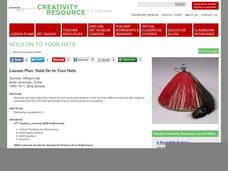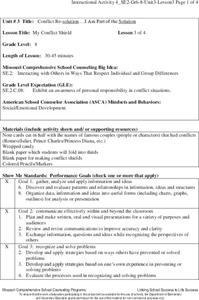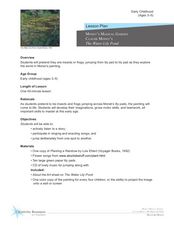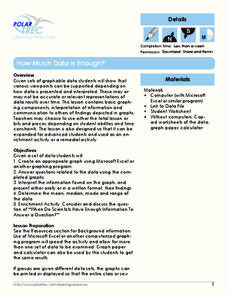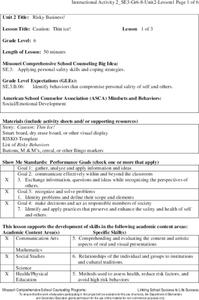Curated OER
Bombardier's Mission Statement
Students review a mision statement and misison essentials for the CBC . They study the Bonbardier Corppration and develop a mission statement for the company.
Curated OER
What's in the Time Capsule? A Technology-Connected Lesson Plan
Twelfth graders use computers and the Internet to research a specified area, word processors to prepare an essay, a digital camera, a video camera gather visuals, and a scanner to add visuals to a PowerPoint presentation as they discover...
Curated OER
Immigration Project
Students visit Ellis Island Immigration Museum (as a field trip or a virtual visit) and pretend to be Italian immigrants to the United States. They write a journal entry detailing their first week in the United States. They interview an...
Curated OER
Science: Schoolyard Trees
Sixth graders choose specific trees to research while taking a nature walk around the schoolyard. They discuss tree and leaf parts and observe various types of leaves. After writing their reports, 6th graders present them to the class...
Curated OER
Ethnic Humor
Uncovering the function and forms of ethnic jokes, this presentation with enlighten your students as it explores the concept of "insiders vs. outsiders" and various examples of ethnic stereotypes in literature and society. The...
Curated OER
"The Wind" by James Reeves
Inntroduce primary learners to essential critical reading strategies with an activity based on James Reeves' poem, "The Wind." Learners listen as the poem is read, first as a riddle, and then re-read with the title visible. The...
Curated OER
Hold On to Your Hats
Elementary schoolers study the symbolism and influences found in advertising. First, they learn about the history and cultural significance of the Summer Official's Hat that was a symbol of status in ancient China. Then, they access...
Kenan Fellows
Using Water Chemistry as an Indicator of Stream Health
Will this water source support life? Small groups test the chemistry of the water drawn from two different sources. They then compare the collected data to acceptable levels to draw conclusions about the health of the source. The...
Missouri Department of Elementary
My Conflict Shield
As an exercise in self-awareness and improvement, class members create a Conflict Shield listing 12 skills they believe are the most useful in conflict resolution. They then color the ones they have mastered while leaving uncolored those...
Denver Art Museum
Alien Beauty
"Beauty is in the eye of the beholder," is a popular phrase in our society. The lesson plan here puts the phrase to the test as pupils explore what truly is beautiful through a study of some Japanese folk art. A careful examination of...
National Center for Case Study Teaching in Science
Breast Cancer Risk
How does one determine whether or not someone is at risk for breast cancer? Find out through a comprehensive case study involving two readings and a group activity in which learners assess four women's potential for acquiring the...
Macmillan Education
Communication
Especially tricky for language is understanding the line between inappropriate, confrontational, (in)effective, (un)reasonable and diplomatic English. The activities in the resource permit class members to practice...
Curated OER
Get in Shape with Geometry
Using geoboards, computer programs, and hands-on manipulative materials, elementary schoolers engage in a study of two and three-dimensional geometric shapes. This lesson is chock full of good teaching ideas on the subject, and the...
Curated OER
Jazz in America Lesson Plan 7
The student will explore free jazz, fusion, and contemporary jazz. They will listen to avant garde, fusion, and pop recordings. In addition, they participate in a class discussion regarding jazz's contribution to and reflection of...
Curated OER
Monet's Magical Garden
Students study classic paintings by masters like Monet. In this art history lesson, students listen to the story Planting a Rainbow by Lois Ehlert and sing flower songs with the rest of their class. Students examine the painting The...
Polar Trec
How Much Data is Enough?
The next time you read a magazine or watch the news, make note of how many graphs you see because they are everywhere! Here, scholars collect, enter, and graph data using computers. The graphs are then analyzed to aid in discussion of...
Society for Science & the Public
Easter Islanders Made Tools, Not War
When studying artifacts, especially tools, how do archaeologists determine what the devices were used for? In what ways might researchers' previous experiences influence their perception of an artifact? An article about researchers'...
Missouri Department of Elementary
I’m Thumbody!
Positive and negative thinking is the focus of a instructional activity that boost self-awareness. Beginning with a whole-class discussion, scholars brainstorm what positive thinking looks and sounds like then compares and contrast the...
Missouri Department of Elementary
Caution: Thin Ice!
Sixth graders listen to a story titled "Thin Ice!" then partake in a whole-class discussion asking and answering questions about what was read. Scholars brainstorm risky behaviors in preparation for a game of RISKO—a game similar to...
Asian Art Museum
Japanese Architecture for Elementary School Students
Art and architecture go hand-in-hand. Kids watch clips from the Hayo Miyazaki film Spirited Away to better understand Japanese customs and architecture. The discussion questions included are very good, and will help you lead the class in...
Curated OER
Inspired Innovation
Throughout time, innovators have taken basic ideas and changed them into creative and cutting-edge designs. Kids tackle the topic of innovations in relation to traditional or creative objects. They discuss traditional Navajo pottery then...
Smithsonian Institution
Solomon G. Brown: Letter Writing
Personal correspondence in the form of letters is not as common as it once was. This resource presents an opportunity for you to introduce your class to letter writing and cover topics in social studies. Learners read a letter written in...
Center for History and New Media
Slavery and Free Negroes, 1800 to 1860
What was life like for enslaved and free black people before the American Civil War? Explore the building tension between states and the freedom of individuals with a thorough social studies lesson. Learners of all ages explore...
Texas Education Agency (TEA)
Geometry in Architecture #1
Discover how to analyze architecture from a geometric standpoint. The fourth installment of an 11-part unit on architecture first provides a presentation on axis, balance, basic form, formal, pattern, proportion, symmetry, and tripartite...








